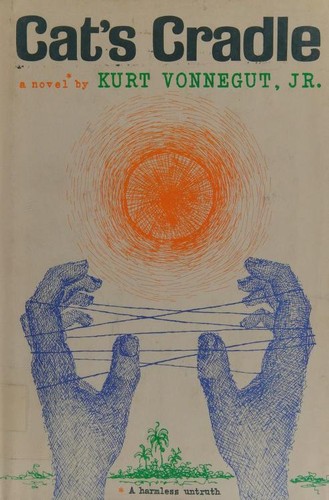Thoughts on reading Cat's Cradle by Kurt Vonnegut.

Cat’s Cradle is an odd book. Truly unique and epically cynical, Kurt Vonnegut’s satirical scythe cuts down religion, science, and history, encapsulating cold war apocalyptic fears and existentialism of the western hemisphere, while showing great leniency to the more enlightened and transcendental forms, benign, of course, art, literature, and love.
Vonnegut’s positioning of natural expression over natural study initially provoked my disdain, aligning too perfectly with the philosophical outlook of far too many teenage boys riddled with pretentiousness and liberal adults obsessed with thought over knowledge. It’s hard to get worse than one of Vonnegut’s many aloof stand ins for science explicitly exclaiming “‘Prue research men work on what fascinates them, not on what fascinates other people’” (49), while the protagonist, a journalist and author, l ponders that “When a man becomes a writer, I think he takes on a sacred obligation to produce beauty and enlightenment and comfort at top speed’” (232).
Yet there is a point in Cat’s Cradle, I’m not exactly sure where, when the black comedy wins me over and I am forced to rationalize Vonnegut’s portrayal of vocations; the disdain for science, religion, and history spurred by an unpardonable obsession with war and oppression.
Maybe this point is when we are introduced to the idea of a granfalloon, “a seeming team meaningless in terms of how of the ways God gets things done” (91) such as the “Communist party, the Daughters of American Revolution, the General Electric Company, the International Order of Odd Fellows - and any nation, anytime, anywhere” (92). Or maybe it’s when the protagonist questions a military man on the infrastructure of San Lorenzo: “‘Fort Jesus?’ ‘The training camp for our soldiers.’ ‘It’s named after Jesus Christ?’ ‘Sure. Why Not?’” (188). Or maybe when the Book of Bokonon states “Without accurate records of the past, how can men and women be expected to avoid making serious mistakes in the future?” (237). Or maybe when …
Cat’s Cradle is rife with comedy and irony and satire and characters and plot and setting and fears and prose that is wholefully its own; and I could not hold it in a higher regard.